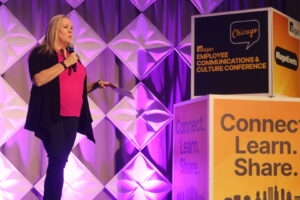Comms etymology: What’s the scuttlebutt? The origins of words heard around the office
How scuttlebutt, gossip and rumors were so named.

“Word has it that Bernice is on her way out.”
“They say the CEO might be investing in an office revamp.”
“When do you think they’ll approve those raises?”
We’ve all done it. Whether you’ve unofficially heard that your manager is pregnant, a restructure is on the horizon or your 401K offering has been changed, word travels fast in organizations — and communicators are positioned at the center any confusion that results.
While many words for interpersonal talk are ultimately imitative (which, in etymological contexts, more or less means onomatopoeic) in origin, including “buzz,” “gab” and “chatter,” others hold more surprising secrets.
From lifeless jargon to toxic talk, read on for intel into the etymology of some of the workplace’s most prevalent types of chatter.
Scuttlebutt
This nautical-inspired term for gossip, rumors and interpersonal news among coworkers dates back to the early 1800s and is quite literally the sailor’s equivalent of “watercooler talk.” A “scuttlebutt” is a cask of fresh drinking water aboard a ship, around which sailors loitered and chattered much as they might around the watercooler in an office break room.
“Scuttle” here refers to a hole (also seen in the term “scuttling” or opening or blowing holes in a ship’s hull to deliberately sink it) in the top of the cask, while “butt” is recorded as a word for a cask or barrel as early as the 14th century — indeed, before it’s recorded as a word for a rear end.
Gossip
“Every man is surrounded by a neighborhood of voluntary spies,” wrote Jane Austen in “Northanger Abbey.”
Curiously, this word originally meant “godparent.” It evolved from the Old English term godsibb, literally “God relative,” related to the word “sibling,” which in Old English was a term for any relative or kinsperson.
Spelling was flexible at the time, and ultimately the variation “gossip” prevailed as the word expanded in Middle English to become a word for a close friend or neighbor.
Indeed, it was especially used as a word for women friends who got together often for social occasions. And what, according to gendered stereotypes, do women friends do when they get together socially? They chat idly about the people and happenings in their lives.
By the 16th century “gossip,” had taken a negative turn, describing someone with a voracious appetite and habit for collecting and spreading rumors.
It transitioned to a word, not for the people chatting, but for idle socialization — particularly of the more scandalous and rumor-driven variety — in the 19th century.
Rumor
Rumors tend to spread across workplaces quietly, but the etymology of the word itself speaks to the volume of their potential impact and how loudly they can reverberate through an organization.
Although the Latin predecessor rumorem shared the same sense as the English word today, it literally meant “noise” or “clamor.” This sense shows up in early French and English writings and literature as a term for a commotion or a public outcry, along with the hearsay and claims that might emerge from it.
Even in the Elizabethan era, poet Michael Drayton wrote of the “the rumorous sound” of the crashing Red Sea.
Putting aside the darkness inherent in “rumor” especially, scuttlebutt and watercooler talk serve a purpose for building interpersonal relationships within the workplace. To wit, communicators must strike a balance between encouraging friendly scuttlebutt and ensuring, through transparency and open dialogue with employees, that a raging sea of rumors doesn’t become flood communication channels to become a larger crisis.
Jess Zafarris is a content director, editor, journalist, speaker, social media engagement strategist and creator. Her 13 years of experience in media included such roles as the Director of Content at Ragan Communications, Audience Engagement Director at Adweek, and Content Strategy Director and Digital Content Director for Writer’s Digest and Script Mag. Follow her on Twitter/Threads/IG and TikTok @jesszafaris and connect with her on LinkedIn.







